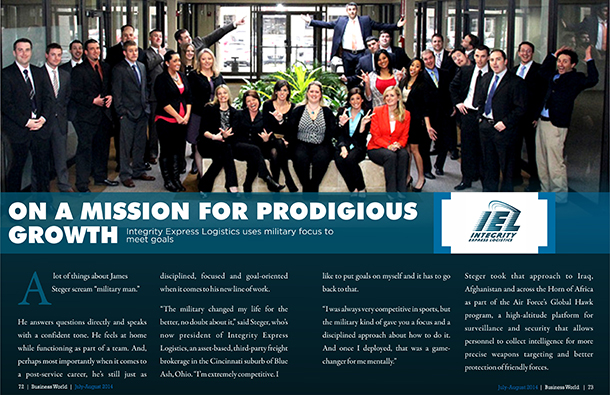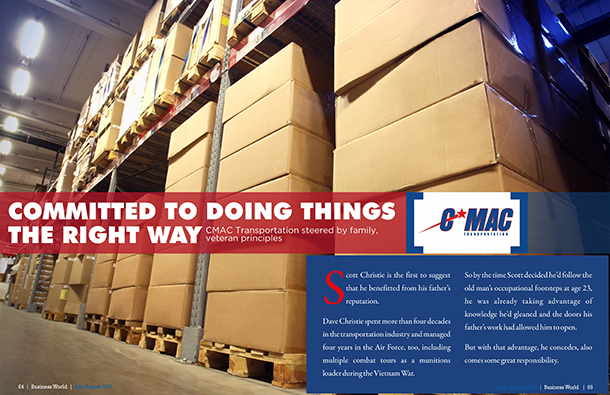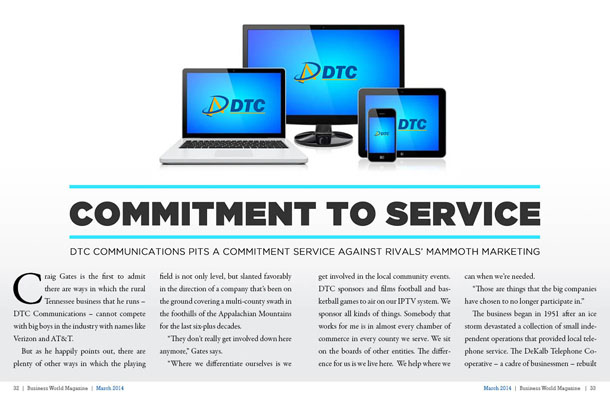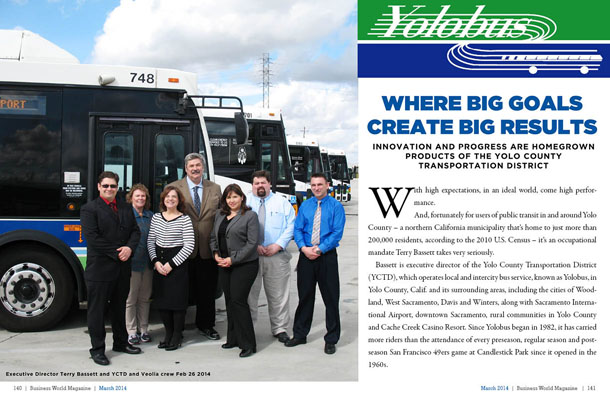
Where Big Goals Create Big Results
Innovation and progress are homegrown products of the Yolo County Transportation District
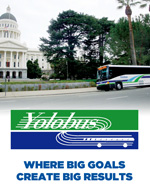
With high expectations, in an ideal world, come high performance.
And, fortunately for users of public transit in and around Yolo County – a northern California municipality that’s home to just more than 200,000 residents, according to the 2010 U.S. Census – it’s an occupational mandate Terry Bassett takes very seriously.
Bassett is executive director of the Yolo County Transportation District (YCTD), which operates local and intercity bus service, known as Yolobus, in Yolo County, Calif. and its surrounding areas, including the cities of Woodland, West Sacramento, Davis and Winters, along with Sacramento International Airport, downtown Sacramento, rural communities in Yolo County and Cache Creek Casino Resort. Since Yolobus began in 1982, it has carried more riders than the attendance of every preseason, regular season and postseason San Francisco 49ers game at Candlestick Park since it opened in the 1960s.
And it’s the standards of the ridership – which includes college students at UC Davis and professionals who work downtown in the capital district – that keep organization’s bar in a state of perpetual raise.
“We have a very intelligent ridership clientele, so the levels are kept pretty high,†he says. “Plus we have employees with a lot of interests and a board of directors that’s very supportive of us doing the right thing.â€
The perfect storm of lofty aspirations and in-house cooperation have made the Yolo organization a model of in-front-of-the-curve innovation – both environmentally and otherwise – for much of the 32 years since it broke from the regional transportation provider and began contracting bus services with the private sector, a decision Bassett claims has saved taxpayers more than $50 million.
Yolo transitioned from a joint powers agreement run by Yolo County to a separate authority run by a board of elected officials and senior staffers. In 1996, the state legislature and governor approved creation of the district, whose appointees come from the four cities in Yolo County, the Yolo County Board of Supervisors and representatives from UC Davis and the California Department of Transportation (Caltrans).
All but 10 of the 125 employees involved with providing Yolobus service are employed by Veolia Transportation, which has been working with Yolo since 2006 and is contracted, with options, through 2018.
“We have been very happy with the performance of Veolia, particularly its management team headed by Carmen Alba (general manager), Tom Follansbee (operations manager), Mikhail Tsytsurin (maintenance manager) and Dan Thao (safety and training manager),†Bassett says. “We also get solid corporate support from such people as Ken Westbrook (chief operating officer of Veolia’s transit division), Ron Bushman (regional VP), Jacob Ortiz (regional director of safety), Rudy Woodward (VP of technical services), Ed Remly (regional director of maintenance), Phil Isaacs (regional human resources director) and Howard Morris (regional controller).â€
In-house, Bassett is assisted by Janice Phillips (deputy director), plus eight people who count fares, issue passes and provide other customer service, provide staff support services to Bassett and YCTD’s board of directors, perform service planning, undertake procurement and other financial responsibilities, administer grants, run an IT department and perform customer outreach.
YCTD has also had a great deal of success hiring part-time undergraduate and graduate students from UC Davis, Sacramento State University and Woodland Community College. Many of these students have used YCTD to launch their professional careers.
When operations began in 1982, the 14-unit diesel-powered fleet was neither wheelchair-accessible nor new – with an average per-bus age of 16 years – and the bus yard was a gravel yard in what now is West Sacramento. These days, routes are so plentiful that enough miles are logged to make a trip from Sacramento to either Beijing, China or Warsaw, Poland every weekday.
Today, the fleet includes 44 CNG buses with wheelchair access, six accessible highway coaches that accommodate 57 passengers and run on clean diesel fuel, and 10 smaller vehicles used primarily for the elderly and disabled.
Yolobus got its initial grant to investigate the use of (CNG) as fleet fuel back in 1989. El Paso Natural Gas, Chevron Research, Sierra Research, Pacific Gas and Electric Company, the Yolo Solano Air Quality Management District and FTA (then called UMTA) were partners in the endeavor. The use of CNG as a daily practice began four years later, and, in the two-plus decades since, Yolobus CNG buses have traveled more than 24 million miles with the low-emission fuel – a distance that, as Bassett takes great pride in pointing out, is enough to circle the Earth more than 1,000 times.
The district built a CNG facility where fuel is available to the public at roughly a dollar less per gallon equivalent than gasoline. Outside companies, like Waste Management of Woodland, and private car owners use the CNG public dispenser.
“One of the biggest early challenges for the transit industry was to show engine manufacturers that there was enough reason to start building bus-sized CNG engines,†he says. “But we, and most notably Sacramento Regional Transit District and Sunline Transit, kept encouraging them and we stayed the course and, slowly but surely, the technology improved. There is a lot of natural gas available in the U.S. and it’s a cheaper commodity than diesel or gasoline.â€
In 2000, Yolobus negotiated an agreement, including financial participation, with the county of Yolo and Wintun Indian Nation to provide bus service to Cache Creek Casino Resort, about 20 miles west of Woodland, which employs more than 2,300 from Yolo and Sacramento counties and beyond.
All the progress leaves Bassett to another favorite hobby – coming up with additional interesting figures to populate the website’s Did You Know page.
Among them:
- At any given time, there are as many as 41 Yolobus buses fixed route buses and seven ADA-serving para-transit vehicles on the road;
- Yolobus makes 244 trips to the Sacramento International Airport every week from various locations; and
- Yolobus provides service on the street 21.7 hours each weekday.
“I do it for fun,†Bassett says, while pointing out the more than 32 million passengers transported since day one exceeds the population of Texas. “The progress we’ve made comes from reading the tea leaves for the future and figuring how best to accommodate changes and expectations from public.â€
Creation of the district also created a role as a county congestion management agency, which means Bassett and his colleagues are charged with creating and implementing programs to keep traffic levels manageable. Additionally, its tasks as a CMA are helping in land use, air quality and transportation planning among jurisdictions – including the Sacramento Area Council of Governments (SACOG), the cities of Woodland, Davis, West Sacramento and Winters and the county of Yolo – and to participate in and advocate projects that spend funds made available from state gas tax revenues and other sources.
Looking forward, the agency is responsible for monitoring congestion on major roads and analyzing the impacts that proposed developments would have on future traffic congestion.
“We assist the cities and the county in looking at and planning for maintenance, repair and upgrades,†Bassett says. “And we help advocate for funding to get those projects paid for. It’s quite a cooperative effort and we have to make sure the projects align with general plans for the region, SACOG’s Metropolitan Transportation Plan, its “blueprint,†and with local plans. We have some very intelligent people at work, there’s good chemistry and it’s nice to sit in a room where the atmosphere is one of cooperation and we’re all pulling in the same direction.â€
Over the last six years, YCTD has been working with the cities of West Sacramento and Sacramento, the Sacramento Regional Transit District, SACOG, Caltrans and the FTA in planning for the establishment of a streetcar system that will initially serve downtown parts of West Sacramento and Sacramento, as well as mid-town Sacramento. The streetcar will be an added value to the Triple-A baseball stadium in West Sacramento (Raley Field, home of the Sacramento River Cats) and a proposed sports and entertainment complex that would host the Sacramento Kings and other events in downtown Sacramento.
Also on the near horizon is the establishment of a region-wide “Smart†electronic fare card system that will begin testing this summer, with a roll-out scheduled to eight transit operators by the fall.
—————-
AT A GLANCE
WHO: Yolo County Transportation District
WHAT: Local and intercity bus fixed route and paratransit service operator, known as Yolobus. Service is contracted out to Veolia Transportation.
WHERE: Yolo County, Calif.
WEBSITE: www.YoloBus.com


